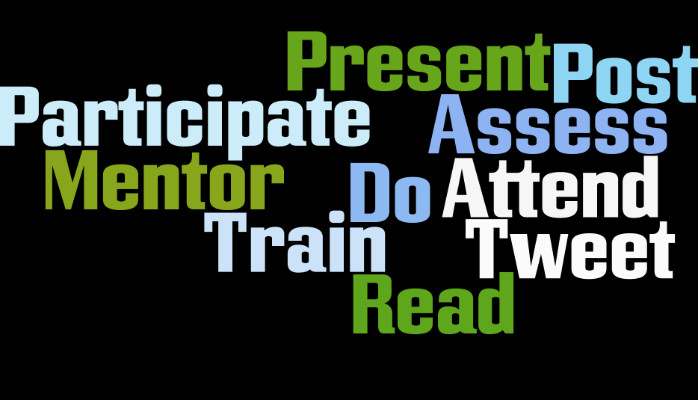
10 Ways to Build Expertise in Knowledge Management
The field of knowledge management (KM) is now about 20 years old. As Patrick Lambe previously pointed out, knowledge management existed before 1995, but the term KM was not widely used.
I have been active in this field for most of that time, and I am often asked how to develop expertise in it. As with most fields, there are no shortcuts to becoming an expert. You have to read, write, listen, attend training and events, and interact with others in the field. But mostly, you need to practice the profession by actually doing the work of knowledge management.
On May 13, 2011, I presented at APQC’s annual KM conference on Building KM Expertise.
Here are 10 ways to build expertise in KM.
1. Assess yourself against the list of 100 KM Specialties
- If you were asked to meet with a client as an expert in the specialty
- would you be comfortable doing so?
- would the client be pleased following the meeting?
- Choose one or more specialties in which
- you are an expert, or
- you would like to become an expert
- Focus your development on those specialties
2. Read books, blogs, periodicals, and sites
- Read books – start with these dozen, then choose ones that match your chosen specialties:
- The Future of Knowledge: Increasing Prosperity through Value Networks by Verna Allee
- Learning to Fly: Practical Knowledge Management from Leading and Learning Organizations by Chris Collison & Geoff Parcell
- Working Knowledge: How Organizations Manage What They Know by Thomas Davenport and Laurence Prusak
- Squirrel Inc.: A Fable of Leadership through Storytelling by Stephen Denning
- Common Knowledge: How Companies Thrive by Sharing What They Know by Nancy M. Dixon
- Implementing a Successful KM Program by Stan Garfield
- Organising Knowledge: Taxonomies, Knowledge and Organisational Effectiveness by Patrick Lambe
- If Only We Knew What We Know: The Transfer of Internal Knowledge and Best Practice by Carla O'Dell & C Jackson Grayson
- The Complete Idiot's Guide to Knowledge Management by Melissie Rumizen
- Knowing Knowledge by George Siemens
- The Wealth of Knowledge: Intellectual Capital and the Twenty-first Century Organization by Thomas A. Stewart
- Cultivating Communities of Practice: A Guide to Managing Knowledge by Etienne Wenger, Richard McDermott, & William M. Snyder
- Read blogs
- Subscribe to periodicals
- Visit sites
3. Join, participate in, and help lead communities – start with the SIKM Leaders Community
- Subscribe: Get email or RSS and regularly read the threaded discussion board
- Post: Start a new thread or reply in the threaded discussion board
- Attend: Participate in community events
- Contribute: Submit content to the community newsletter, blog, wiki, or site
- Engage: Ask or answer a question, make a comment, give a presentation, and help lead
4. Attend conferences – start with these two:
5. Tweet, retweet, and follow tweets
- Follow thought leaders in Twitter
- Participate in a Twitter Chat
- Schedules: TweetReports and Twubs
- Tools: Tchat and Twubs
- Search Twitter using hashtags, e.g., #KM and #KMers
- Ask questions on Twitter using the #KM hashtag
- Use daily themes
#MM Meeting Monday: Link to upcoming conferences and events for the week
#TT Trackback Tuesday: Link to blog posts
#WW Website Wednesday: Link to sites
- #TiTh Title Thursday: Link to books
#FF Follow Friday: Recommend other tweeters to follow
6. Present, speak, lead discussions, and deliver training
- Present at
- internal meetings
- con calls
- community meetings
- conferences
- client meetings
- Ask an established expert to allow you to co-present
- Offer to help facilitate a panel discussion
- Develop and conduct training
7. Post, write, and publish
- Post to a community discussion board, for example, the SIKM Leaders Community
- Write a blog post, for example, on LinkedIn
- Publish a document using Google Docs
- Upload a presentation to SlideShare
- Write an article for a publication
- Use writing to
- test your ideas
- solicit comments
- refine your thinking about a topic
8. Attend training
- Online
- At a university
- Before or after a conference
- From a specialized vendor
9. Learn by doing
- Try things out
- Interact with others
- Attend different events to see which ones are the most useful
- Use as many as possible of the 50 KM Components
10. Find a mentor
- Ask someone you respect for a short initial conversation, to be followed by recurring ones if the first one goes well
- Post in a community discussion board to request one
- Write to a book author
- Comment to a blogger
- Reply to a tweeter
- Talk to a presenter at a conference
- Visit the site of a thought leader and send an email message
- If the author, blogger, tweeter, presenter, or thought leader is unable to act as a mentor, ask them to refer someone else
This summary of recommendations and this list of 100 resources may also be helpful.

IT Consultant | PhD in IT @ IIUM, Strategic Planning, Change Management, Problem Solving | Bridging HE, Training & Innovation in Asia-Pacific
2yThanks for Sharing Prof., it is very important for me to enhance the KM exercise. I strongly appreciate your knowledge-sharing aptitudes for others. All faculty members of all universities globally should surely belong to this knowledge-sharing power.
Knowledge Management, Records and Archives Management, Information Management, Web content Management, Research
6yI keep revisiting this page very informative!
Ingeniero de Proyecto
8yThanks again Stan!
Senior Associate, Specialist System Analyst
8yVery informative article, thanks for sharing!